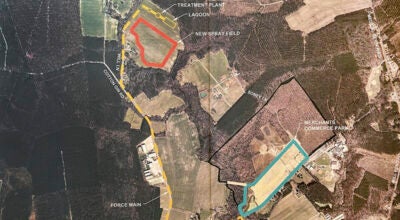Easter travel cheaper than last year
Published 9:18 am Thursday, March 28, 2013
The “pain” at the pump is less severe than the same holiday travel period in 2012.
With the Easter weekend travel period set to begin on Good Friday (March 29), North Carolina motorists will see gas prices nearly 25 cents per gallon lower than the same time last year.
Gas prices are typically higher in the late winter/early spring months, but that tradition seems to be broken, at least in the short term.
Nationally, motorists are paying less at the pump today than a year ago, saving nearly 25-cents per gallon on average. In North Carolina, motorists are seeing local prices averaging $3.63 per gallon as of Wednesday, a reduction of 22.9 cents per gallon versus 2012 prices.
The Ahoskie market, which runs roughly 8-to-10 cents higher than the state average, had gas at $3.73 per gallon as of noon on Wednesday.
“It’s a stark contrast from last year when we saw the national average at $3.87 on this date edging closer to the peak that occurred April 5 at $3.93,” said Patrick DeHaan, senior petroleum analyst with GasBuddy. “The numbers don’t lie. Retail gas prices this year have declined at a time when we’re more accustomed to steady increases. Especially when we compare with last year it reflects stronger refinery performance; relatively smooth and uneventful transition to ‘summer blend’ gasoline; and, the absence of catalysts that could push prices in the other direction.”
AAA Carolinas confirmed that gas prices typically increase in the early spring months, when refineries perform maintenance and make the switch over to summer-blend production, reducing supply.
However, this year the increase occurred earlier than usual, rising 58 cents from $3.22 on Dec. 20 to $3.80 on Feb. 22, before trending back downward. Many refineries have yet to transition to summer-blend gasoline, so it’s uncertain whether prices have peaked for the spring.
“The good news is that we’re paying 25 cents per gallon less than last Easter, and gas prices continue to decline,” said David E. Parsons, president and CEO of AAA Carolinas. “As we head into the summer travel season we expect prices to remain lower than what we saw last year, barring any supply issues or tensions in the Middle East.”
In 2012, Easter fell on April 8, roughly a week later than this year. Although the Easter holiday isn’t traditionally a heavy travel weekend, many North Carolina schools are on Spring Break, which increases traffic congestion and demand for gas.
According to AAA Travel, motorists looking for ways to conserve gasoline while traveling should keep the following tips in mind:
Monitor driving behavior, follow the speed limit and avoid accelerating or decelerating quickly. For every five miles per hour over 65 mph, gasoline efficiency decreases 10 percent.
Make sure tires are properly inflated to maximize fuel economy. See your owner’s manual for the recommended tire pressure for your vehicle.
Keep vehicles properly maintained, including scheduled oil changes and air filter replacements.
Avoid excess weight in your vehicle. When vacationing, try to avoid strapping luggage on the roof where it causes drag and reduces fuel economy.
Whenever possible, consolidate trips.
To estimate fuel costs, travelers can go to www.fuelcostcalculator.com to input starting city, destination, and the make and model of their car. The free AAA Mobile app for iPhone and Android devices uses GPS navigation to help travelers map a route, find updated gas prices, view nearby member discounts and access AAA roadside assistance.


